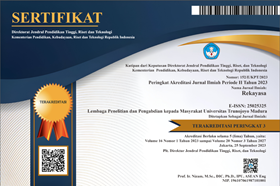Penentuan Strategi Pengelolaan Sampah Rumah Tangga dengan Metode SWOT (Studi Kasus: Bangunjiwo Kasihan Bantul DIY)
Abstract
Waste is one of the problems in Bantul Regency, especially in Bangunjiwo Village, Kasihan District. Bangunjiwo Village has a waste generation of 8.39 tonnes per day, but only 0.03 tonnes can be managed, and the rest is disposed of in landfills. The contributing factors are low public awareness of waste management and suboptimal waste management. The purpose of this study is to propose a waste management strategy to reduce the volume of waste disposed to landfill. This research uses the SWOT method as a strategy planning tool by considering the internal factors of the waste management party and the external factors that surround it. Strategy determination is based on the calculation of the IFAS and EFAS matrix which serves to determine the quadrant position. Then the quadrant position is used as the basis for determining waste management strategies. The results showed that the position of waste management in Bangunjiwo Village is in quadrant 1 (S-O), which means that it must optimise internal strengths and existing opportunities. The strategy formed is a strategy of collaboration between BUMDes and private waste collectors by utilising funds provided by the Regency Government and utilising the existing large land area, as well as increasing the empowerment of Human Resources (HR) for waste management.
Keywords
Full Text:
PDF (Bahasa Indonesia)References
Achmad, F. Y. N. A. (2024). Tantangan Dan Peluang Implementasi Kebijakan Zero Waste Di Kota Baubau. Journal Publicuho, 7(1), 212–223. https://doi.org/10.35817/publicuho.v7i1.348
Andriyanto, R., Fajrini, F., Romdhona, N., & Latifah, N. (2023). Faktor-Faktor yang Berhubungan dengan Perilaku Pengelolaan Sampah Rumah Tangga Di Kelurahan Cilandak Barat Kecamatan Cilandak Tahun 2022. Ilmiah Wahana Pendidikan, 3(1), 10–27. https://medium.com/@arifwicaksanaa/pengertian-use-case-a7e576e1b6bf
Aziz, M. F. A., & Ariffin, R. N. R. (2024). The Implementation of Solid Waste Management Policies in Southeast Asia: The Present Situations and Future Recommendations. The Malaysian Journal of Social …, 133–179. http://jummec.um.edu.my/index.php/MJSA/article/view/51926%0Ahttp://jummec.um.edu.my/index.php/MJSA/article/download/51926/16919
Dai, S. I. S., & Pakaya, S. I. (2019). Pemberdayaan Masyarakat Melalui Pengelolaan Sampah Menjadi Nilai Ekonomis dan Pembentukan Bank Sampah di Kelurahan Tanjung Barat. Jurnal Ilmiah Pengabdhi, 5(2). https://doi.org/10.30874/comdev.2017.21
Febrana, I., Leksono, R. B., & Astuti, P. (2015). Peran Serta Masyarakat dalam Pengelolaan Persampahan secara Berkelanjutan di Kecamatan Sail Pekanbaru. Jurnal Saintis, 15(1), 33–44. https://journal.uir.ac.id/index.php/saintis/article/view/3158
Ferdian, A. (2020). Analisis Strategi Pengolahan Sampah Menggunakan Teknik Matriks Analisis Swot Di Kabupaten Luwu. Jurnal I La Galigo, 3(1), 17–23. https://ojs.unanda.ac.id/index.php/ilagaligo/article/view/393/305
Kasibmabin, Y., Walukouw, A., & Novant, R. (2022). Strategi Pengelolaan Sampah Sebagai Upaya Pembangunan Berkelanjutan Di Kampung Kabiding Distrik Oksibil Kabupaten Pegunungan Bintang. Jurnal MEDIAN Arsitektur Dan Planologi, 12(2), 72–82. https://doi.org/10.58839/jmap.v12i2.1098
Khoiriyah, H. (2021). Analisis Kesadaran Masyarakat Akan Kesehatan Terhadap Upaya Pengelolaan Sampah di Desa Tegorejo Kecamatan Pegandon Kabupaten Kendal. Indonesian Journal of Conservation, 10(1), 13–20. https://doi.org/10.15294/ijc.v10i1.30587
Kusdiah, Y., Sriwati, M., Kasnawati, & Sampe, R. (2024). Peran Pendidikan Lingkungan Dalam Meningkatkan Kesadaran Masyarakat Tentang Pengelolaan Sampah. Jurnal Review Pendidikan Dan Pengajaran, 7(3), 7415–7421.
Mutiara, P. B. (2021). Analisis Matriks Ifas Dan Efas Pt Unilever Tbk Pada Pandemik Covid-19. Jurnal Bina Bangsa Ekonomika, 14(2), 363–371. https://doi.org/10.46306/jbbe.v14i2.90
Ramadhanti, R., & Mardiah, A. (2022). SWOT Analysis for Waste Management Recommendation of Bojong Village, Bogor Regency. International Journal for Disaster and Development Interface, 2(1), 30–45. https://doi.org/10.53824/ijddi.v2i1.10
Rimantho, D., & Tamba, M. (2021). Usulan strategi pengelolaan sampah padat di TPA Burangkeng Bekasi dengan pendekatan SWOT dan AHP. Jurnal Ilmu Lingkungan, 19(2), 383–391. https://doi.org/10.14710/jil.19.2.383-391
Salsabila, A. Z., & Najicha, F. U. (2020). Pengelolaan Sampah Plastik di Kawasan Pantai Depok, Kabupaten Bantul. Jurnal Discretie, 1(2), 87. https://doi.org/10.20961/jd.v1i2.50227
Samadi Khadem, R., Ojaghi Aghchekani, A., & Fataei, E. (2022). Determination of Optimal Urban Waste Management Strategy Using SWOT Analysis: A Case Study. Journal of Advances in Environmental Health Research, 10(4), 305–318. https://doi.org/10.32598/jaehr.10.4.1265
Santoso, R., Tirtaweningtias, S., & Purwita, L. D. (2024). Strategi Pengelolaan Sampah Rumah Tangga di Lingkungan Perumahan Dinas PT Semen Baturaja Tbk. UEEJ-Unbara Environmental Engineering Journa, 04(01).
Sasongko, B., Musriyatun, N., & Siswanto, N. H. (2023). Peningkatan Nilai Ekonomis di Bidang Lingkungan di Desa Jenggolo, Kecamatan Kepajen, Kabupaten Malang. Jurnal Abdimas Jayanegara (JASJ), 1(1), 21–28. https://jurnal.stiekn.ac.id/index.php/jasj/article/view/257
Sidik, H. (2022). Pemkab Bantul Menempatkan Pengelola Sampah sebagai Program Prioritas. https://jogja.antaranews.com/berita/543333/pemkab-bantul-menempatkan-pengelolaan-sampah-sebagai-program-prioritas
Sitompul, D. J., & Laksmono, B. S. (2023). Strategi Peningkatan Partisipasi Masyarakat Dalam Program Kang Pisman Di Kota Bandung. Jurnal Kajian Pemerintah: Journal of Government, Social and Politics, 10(1), 1–13. https://doi.org/10.25299/jkp.2024.vol10(1).15044
DOI
https://doi.org/10.21107/rekayasa.v18i1.28033Metrics
Refbacks
- There are currently no refbacks.
Copyright (c) 2025 Reni Dwi Astuti

This work is licensed under a Creative Commons Attribution-ShareAlike 4.0 International License.
























